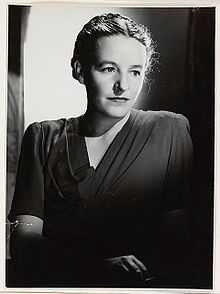Dymphna Cusack

Dymphna Cusack AM (21 September 1902 — 19 October 1981) was an Australian author.
Born in West Wyalong, New South Wales, Dymphna Cusack was educated at St Ursula's College,[1] and graduated from Sydney University with an honours degree in Arts and a diploma in Education. She worked as a teacher until she retired in 1944 for health reasons.
Cusack wrote twelve novels (two of which were collaborations), seven plays,[2] three travel books, two children's books and one non-fiction book. Her collaborative novels were Pioneers on Parade (1939) with Miles Franklin, and Come in Spinner (1951) with Florence James.[3]
The play Red Sky at Morning was filmed in 1944, starring Peter Finch.[4] The biography Caddie, the Story of a Barmaid, to which Cusack wrote an introduction and helped the author write, was produced as the film Caddie in 1976, starring Helen Morse and Jack Thompson. The novel Come in Spinner was produced as a television series by the Australian Broadcasting Corporation in 1989.
Her younger brother John Cusack was also an author, writing the war novel They Hosed Them Out in 1965, republished in 2012.[5]
Contribution and recognition
Cusack was a foundation member of the Australian Society of Authors in 1963 and was made a Member of the Order of Australia in 1981 for her contribution to Australian literature.[6]
Cusack was instrumental in promoting the democratic, progressive traditions of her much loved country, both as a sought-after celebrity speaker in Australia as well as a cultural commentator during her long stays in Europe from the 1940s to the 1970s. It was a socially engaged, writerly stance shared by her famed mentor Miles Franklin and other great names in Australian literary history.
In 1998, the International Federation of University Women (IFUW), based in Geneva, honoured Dymphna Cusack's role in postwar European culture and politics by acknowledging the first doctoral thesis written on the author. The IFUW created "The Australia Award" for Dr. Tania Peitzker's literary and cultural studies analysis of Cusack, funded by the University of Potsdam, Germany.
In 2011, Cusack was one of 11 authors, including Elizabeth Jolley and Manning Clark, to be permanently recognised by the addition of brass plaques at the Writers’ Walk in Sydney.[7]
Novels
- Jungfrau, 1936
- Pioneers on Parade, 1939, with Miles Franklin
- Come in Spinner, 1951, with Florence James
- Say No to Death, 1951
- Southern Steel, 1953
- Caddie, the Story of a Barmaid, 1953. [Introduction only]
- The Sun in Exile, 1955
- Heat Wave in Berlin, 1961
- Picnic Races, 1962
- Black Lightning, 1964
- The Sun is Not Enough, 1967
- The Half-Burnt Tree, 1969
- A Bough in Hell, 1971
Notes
- ↑ http://www.middlemiss.org/lit/authors/cusackd/cusackd.html retrieved on 22 March 2008
- ↑ "Plays by Dymphna Cusack". The Playwrights Database. Retrieved 9 March 2008.
- ↑ Spender (1988) p. 219
- ↑ "Red Sky at Morning (1944)". ImDb. Retrieved 9 March 2008.
- ↑ Wakefield Press, 2012
- ↑ "It's an Honour – 26 January 1981". Australian Government. Retrieved 9 March 2008.
- ↑ “Tribute to Literary Greats on Sydney Writers’ Walk”, Media release by NSW Minister for the Arts, 24 October 2011, http://www.arts.nsw.gov.au/wp-content/uploads/2011/10/111024-Sydney-Writers-Walk.pdf. Retrieved 10 April 2012
References
- Dymphna Cusack bibliography
- Spender, Dale (1988) Writing a New World: Two Centuries of Australian Women Writers, London: Pandora
- Peitzker, Tania (2000). "Dymphna Cusack (1902–1981): a Feminist Analysis of Gender in her Romantic Realistic Texts". Potsdam: Uni Potsdam. Retrieved 27 June 2008.
|